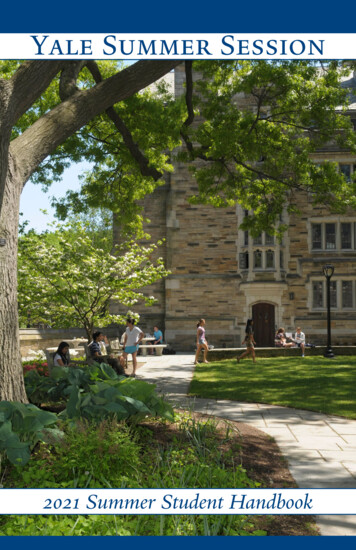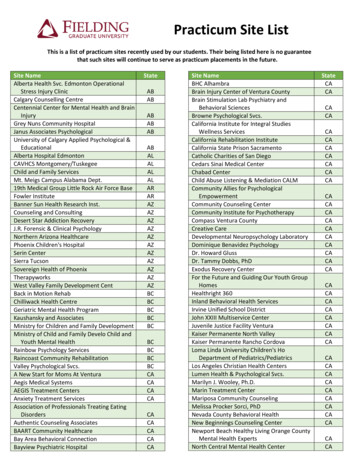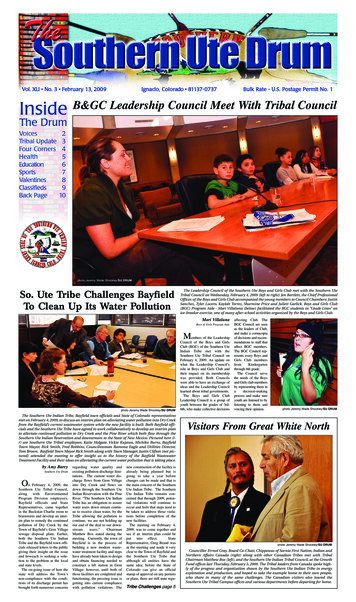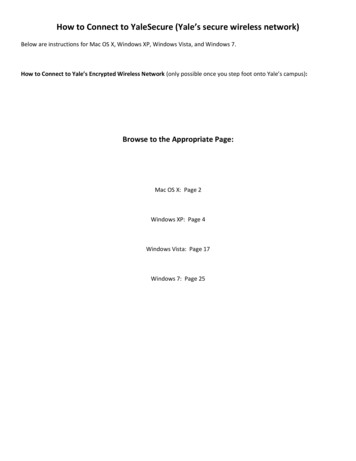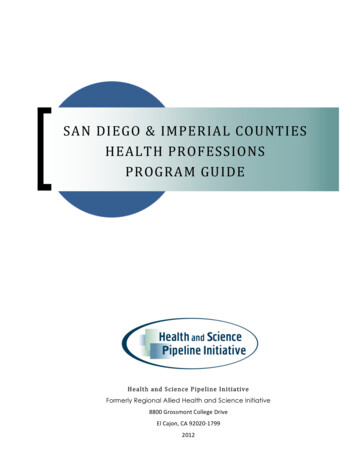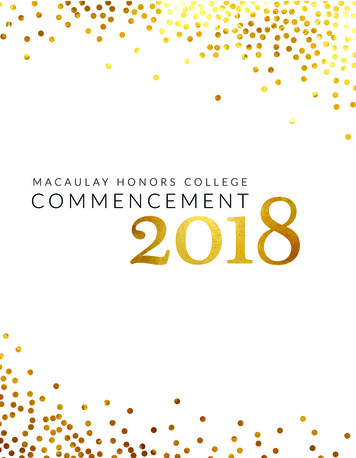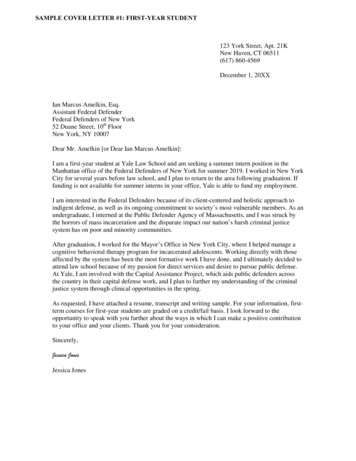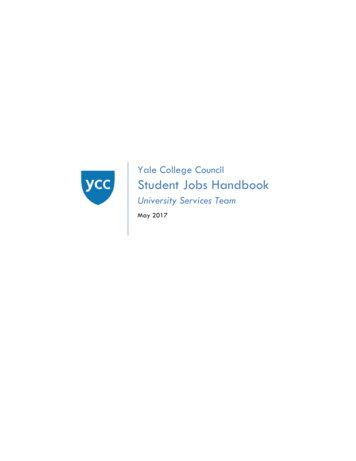
Transcription
Yale College CouncilStudent Jobs HandbookUniversity Services TeamMay 2017
STUDENT JOBS HANDBOOKTABLE OF CONTENTSIntroduction . . 3Before the Job Search. . . .4Yale Policies . . . .4Important Considerations 5The Search Process . . . . .7Finding a Job . .7Resumes . . . . .9Cover Letters . . .12Interviews . . 13Succeeding in Your Employment . . 15Payslips . . .15Direct Deposit . . . .15Federal I-9 Form .15Tax Returns . .15Special Considerations for International Students . 16Balancing Employment and Academics .17Building a Relationship with Your Employer . .17Maintaining a Job and Getting Promoted . .18Asking for a Raise .18Off-Campus Employment . .19Conclusion . .19Acknowledgements. . .20Appendix A . . . . 222
STUDENT JOBS HANDBOOKINTRODUCTIONWelcome to your comprehensive guide for student jobs at Yale! Thanks to support from the YaleCollege Dean’s Office, the Yale College Council has compiled this document to encompass almostall aspects of the on-campus job search. Many of us have been through the struggle of finding anon-campus job, and we hope that our advice below makes the process easier for you.Did you know: According to a 2015 Georgetown University study, 70% of college students in thelast 25 years have held a job while in school. Undergraduates from all different backgroundswork on-campus jobs - so it is not abnormal, and you don’t have to go through the job searchalone!3
STUDENT JOBS HANDBOOK4BEFORE THE JOB SEARCHYale PoliciesTime: Yale limits how much time you can work at an on-campus job in a given week. When schoolis in session, you can work up to nineteen hours; during academic breaks and/or the summermonths, the maximum is forty hours.Pay: Minimum wage for an on-campus job is currently 12.50 per hour. However, Yale jobs arebroken down into five levels that determine your pay: Level One: 12.50/hourLevel Two: 13.00/hourLevel Three: 13.50/hourLevel Four: 14.00/hourLevel Five: 14.50/hourHere are some general examples of what kinds of jobs can fall under each category (though youshouldn’t assume a certain level for any position): Level One: library and some office jobsLevel Two: basic research positions and more involved library jobsLevel Three: research positionsLevel Four: technical or phone support jobsLevel Five: higher-skilled research positionsA select few jobs fall outside these categories and are labeled on the student employmentwebsite as “Student Job, Exception.” They generally pay higher!Do not be discouraged if you have spent some time working in a level one job and feel as thoughyou should be making level two pay. Later in the guide, we will discuss tips on how to ask youremployer for a raise. Keep in mind, though, that the Connecticut minimum wage is 10.10—soYale’s 12.50 minimum wage is higher than you might have received in past employmentelsewhere.Provost’s 50/50 Rule: The Office of the Provost supports undergraduate employment byproviding funds to cover 50% of eligible student wages. This initiative allows campusorganizations to hire more students, particularly those with financial need. However, the totalamount of funding provided to a particular school or department - or for a particular employee may be limited. In order to qualify for student wages that are 50% central funding from theProvost Office, student wages must meet the following criteria: The student earner must be an undergraduate who qualifies for need-based financial aid.The student earner must be enrolled full-time at Yale.
STUDENT JOBS HANDBOOK 5The employing office must pay wages via time entry (hourly wages), as opposed tostipend.The employing office must pay the student earner on the weekly payroll.Hourly wages cannot exceed 15.00.Students must earn and receive wages during the academic year and/or term recesses.Wages charged to a sponsored award (grant) are not eligible.Wages charged to agency or community service accounts are not eligible.Wages charged for work of a religious nature are not eligible.Wages charged to Associated Student Agencies and other administrative departments asdefined by the Provost’s Office are not eligible.Students should not work more than 19 hours per week, except during term recesses.Yale allocates a portion of its federal work-study grant to support 75% of eligible wages ofstudents working in approved community service organizations (or 100% of eligible wages ofstudents working in the America Reads and America Counts programs). Student wages mustqualify for the funding according to federal work-study guidelines, and Yale’s StudentEmployment Office must approve programs annually. Keep in mind that funds are limited and allapplications may not be accepted, so this opportunity is not guaranteed.FES (Forestry & Environmental Studies) Work-Study Guidelines: So-called “FES Work-Study”positions are aimed at students in the School of Forestry & Environmental Studies. You’ll see manysuch openings on the student jobs site, and although they are not necessarily tailored towards you,you can still apply, particularly if you have expertise that relates to a given position.Important ConsiderationsWhen looking for a job and deciding whether to accept an offer, you should consider (1) theorganization, (2) the work that you’d be doing, and (3) logistical concerns about the position.First, the organization - some of the best on-campus jobs are ones that you can put on yourresume. While you can gain transferable skills in many jobs - we’ll talk about that next – workingit can help to work at an organization that potential employers might recognize. For example, ifyou’re a Political Science major, you might consider pursuing a position under the department’sregistrar or, even better, with one of its professors. Conversely, if you’re an Environmental Studiesmajor, then perhaps working at the Yale Farm or with the Yale Sustainable Food Project may bea good choice. Finally, if you work with an organization whose portfolio you’re interested in,opportunities could arise through the connections that you make there. So, by working in theregistrar’s office for the Political Science Department, you may get to know professors casually.Then, when they need a student assistant, you’ll come to mind.Second, the work that you’ll be doing - this is just as important to think about as the organization.What will your day-to-day tasks be, and what skills will you gain? Is the job administrative or
STUDENT JOBS HANDBOOK6research-based, or is it less formal, like cooking food in the buttery? All of these considerationshave upsides and downsides. For example, thinking just as critically at work as in classes might beoverwhelming for some during a tough academic semester. If you believe that you fall into thiscategory, then maybe choose a less intellectually-taxing job, such as shelving books or helping inthe dining hall. Alternatively, if you want experience that can help you get a summer internship,then a research or administrative position might make sense after all.It’s also useful to think about what skills various jobs will give you (e.g., data analysis, websitemanagement, event planning, cooking, research, communications, fundraising, a new language,etc.). Even if an opening isn’t with an organization that you’re particularly excited about, it stillmay be worth pursuing for the transferable new expertise that you gain. In future job interviews,you’ll be able to explain how your experiences in one field make you a successful candidate foranother.The last category to consider is the logistical details, as these will make a huge difference inwhether your daily job experience is positive. You might think about or even ask your employersome relevant questions after you get the job but before you decide whether to accept it: Location: Is the job close to your classes or dormitory? How would you feel about walkingthere in the snow on a dreary Monday morning?Hours: Is the office only open from 9:00am-5:00pm, or can you do some work fromhome/on the weekends?Student workers: Does the office employ other students, or will you be the only one?o There are negative and positive consequences to working alone. If you’re the soleundergraduate, then you’re the main point person for your employer and will getmany opportunities to prove yourself - but you might have less fun doing it.Dress code: Can you wear clothes that you normally wear to class, or does the office havemore specific regulations?Flexibility: What happens if you have a big exam the next day that you’re not preparedfor? Will your employer allow you to skip work? Will he/she/they be understanding ifyou need to study more and thereby work less during a certain week?Office culture: Does the office employ people with whom you enjoy talking?Pay: What is the level of pay?o While the minimum wage at Yale is very high, the pay scale still varies. Look forjobs that pay the most! However, recognize that first-year students often work theirway up this ladder.Manager: What is your supervisor like? Would you get along with him/her/them?o Managing comes in different forms, so try to think through what you know aboutthe individual, and decide whether you’d mesh.Work/school balance: Is it important that you are able to do homework at your job? If so,can you? (More information on this later!)
STUDENT JOBS HANDBOOK7THE SEARCH PROCESSFinding a JobNow that we’ve discussed what to keep in mind when choosing a job, let’s talk about navigatingthe many ways in which you can find a job. During the search process, it is important to beproactive, take initiative, and respectfully reach out to prospective employers. Students havefound both on- and off-campus jobs in a few ways:1. Yale Student Employment Jobs Portal (www.yalestudentjobs.org)The jobs portal is the primary medium by which students find jobs on campus, as manyemployers use it to access a wide pool of applicants.a. Navigating the Jobs Portal: The portal’s Student Control Panel allows you to findjobs and log hours worked. The search for a job tab (under tools) lists a variety ofcategories under which employers can post positions; many that are considered‘on-campus jobs’ are also cross-listed under temporary and/or summer jobs. If yousign up for JobMail, you can get notifications when openings arise.b. Qualifications: Each job description outlines both logistical details and thequalifications that the position requires. For more technical jobs, employerstypically adhere to specific guidelines on a necessary skillset, but thoserequirements may be more flexible for other positions. For example, administrativeones might expect learning in the office. Even if you do not fulfill all of thequalifications but are still interested in the opening, do not hesitate to apply!c. Job levels: These categories specify the degree of intensity that a job requires,ranging from one to five. After holding a few on-campus jobs, you will likely beable to more accurately gauge what each level means, so don’t worry if they seemambiguous now. Furthermore, do not let the categorization of a certain positiondeter you from applying to it. Potential employers will be willing to discuss how ajob can most effectively fit your schedule and maximize your skillset.d. Communication with Employers on the Jobs Portal: Let’s say that you have alreadysubmitted some applications on the jobs portal. As one of many candidates, youmay be able to set yourself apart by proactively communicating with theemployer. In some job descriptions, employers specify that you send them items tosupport your application, such as a resume. This message is a chance to furtherelaborate on your interest in the position, but keep it short - within about one scrollon a mobile emailing app. A few days after submitting the application, you canalso contact the employer simply asking if they’ve received it or if there’s a dateby which they’ll reach out to you. Finally, if you have not heard back from theemployer at most two weeks after submitting your application, email them! Letthem know that you are still interested in the opening if that is the case.
STUDENT JOBS HANDBOOK8NOTE: If you are planning to find a job on campus using Yale’s jobs portal, makesure that you start early, as openings are most plentiful at the beginning of eachsemester (particularly the fall one). If landing an on-campus job is a priority,checking the portal should be one of the first things that you do upon arriving tocampus.2. Networking (Friends, Online, Social Media, Clubs)Some students get on-campus jobs by checking social media, talking to friends, ornetworking in other fashions. Many undergraduates work on campus, so it’s likely thatpeers know of openings that might not be posted yet. If you are interested in a specificposition, talk to students who hold or held it! Social media is a good source as well, asposts in class groups on Facebook might highlight job openings in startups or otherbudding business ventures.3. Professors and Academic DepartmentsYale’s status as a research institution opens up many opportunities for undergraduates toresearch with a faculty member, either as an assistant or independently. The ResearchDatabase provides a rich listing of instructors who need some help in labs or on projects,though many of these openings may not be paid(http://yura.undergradresearch.org/database/). Paid positions might involve note-takingor grading, especially for large lectures. Many departments also have positions forstudent assistants to help with events and usually highlight such term-time or summeropportunities in their weekly newsletters. You could contact the administrative assistant ofthat department for questions about any of its positions.4. Cultural HousesYale’s Cultural Houses (AFAM, AACC, NACC and La Casa) often have positions for studentstaffers and peer liaisons. They may be year-long or semesterly and involve working withcultural house deans to ensure smooth management of the centers.5. Center for Teaching and Learning (CTL)Tutoring jobs administered through the Center for Teaching and Learning (CTL) allowstudents with high QR, writing, or language expertise to support peers who need extrahelp outside the classroom. As such, some of these positions require instructorrecommendations and/or proficiency tests.6. Still no luck? Talk to someone at Student Employment/OISS, or your Dean/HoCIf you would like some help in the job search, do not hesitate to reach out to the staff atthe Student Employment Office (246 Church Street) to find out what other options mightbe available to you. If you are an international student, you might reach out to someoneat OISS for further direction. You can also always talk to your dean or head of college,
STUDENT JOBS HANDBOOK9both of whom might have access to less publicized openings or could refer you to positionswithin your residential college. The most important thing is to NOT STAY SILENT when thejob process seems to be moving slowly or not reaping rewards, as many job-seekers needemployment to support their student income contribution and campus life.7. Other Informal JobsParticipating in studies through Yale’s School of Management (SOM), School of Medicine(YSM), or behavioral labs can be a means of accessing quick financial support. Studies atthe SOM usually pay from 5 to 30, whereas those at the YSM can pay upwards of 200. You can subscribe to different departments’ emails lists for notices about theopportunities, and labs often post flyers about such studies across campus as well. Studiesat the YSM, though, require prospective participants to call a research coordinatorbeforehand to test for qualification. Even if you aren’t able to participate in a givenstudy, you can request that they keep your information on file and call you for subsequentones.8. Non-Yale JobsNew Haven has a wide variety of opportunities for students to gain employment. See theoff-campus employment section at the end of this handbook for more information.International Students: Off-campus positions are typically not allowed due to visarestrictions.ResumesResumes are a compilation of your past work experience, skills, activities, educationalbackground, etc. - in other words, a snapshot of what you would bring to the table, an overviewof your interests, and a way to establish credibility. Think of them as an advertisement of yourselfthat will motivate your employer to interview or even hire you.Formatting: One of the most daunting parts of starting a resume can be organizing all of therelevant information into a clear, easy-to-read format. You can either craft your own - forexample, if you have a talent for graphic design, your personal touches can set you apart - orfind an online template to use. At the end of the day, you want a format that can present yourinformation in a well-organized fashion. Here’s a snapshot of one that you can use as a model:
STUDENT JOBS HANDBOOK10Here are some formatting tips to keep in mind: Consistency is key. Adopting the same style throughout makes your resume easy to readand places appropriate degrees of emphasis on its varying elements. Use reverse chronological order with your most recent experiences first. Keep your resume to one page (unless if it’s an academic CV). Make it simple, and refrainfrom filling up every available space with information. Sections like “objectives” and“summary” are usually fluffy and unnecessary and can be conveyed in a good cover letteror follow-up email.
STUDENT JOBS HANDBOOK Make your resume readable! This means standard, 10-12 point font with reasonablemargins and without crazy spacing options. Do not use abbreviations, slang, or personal pronouns (I, me, you, we).11General Tips on Content: It can be difficult to determine what to put in your resume. If you arewriting your first one - maybe just to have on-hand - don’t be afraid if it seems to includeeverything about you. However, you should keep in mind the following regarding its content: DO NOT include personal information, such as your age or marital status. Restrict information to the last 2-3 years, with an exception for something particularlyrelevant or noteworthy. Avoid fuzzy words/phrases like “creative thinker” that don’t actually say anything aboutyou. Tailor your resume to the job that you’re trying to get. Think hard about the skills that you have! Don’t worry if you haven’t held a formal jobbefore; many haven’t before college, and everyone starts somewhere. Furthermore, yourpast experiences have given you skills that are definitely applicable to an on-campus job.What have you done recently that has required you to be responsible, punctual, andorganized? Have you ever managed a budget for a school club? Do you writeparticularly well? Don’t under-sell yourself. If you took the lead on a project, say so. On the other hand, do not misrepresent your skills. It’s okay to start out with a relativelysparse resume. Fill in the blanks with your enthusiasm and character in your cover letter orin other parts of your application, but don’t allow the pressure to add content make yousay that you’re ‘fluent’ in Spanish when you can only understand a few phrases.Education: In this section, most people include their graduation year and GPA, as well as anymajor academic honors. If you’re applying for a research position or something related to anacademic discipline, you might consider listing previous coursework that could help you with thejob. Some jobs, such as those in tutoring, may require you to have specific knowledge or curriculardepth as well that you should outline.Work Experience and Activities: Try to include your most recent, relevant experiences. Do notassume that the person reading your resume knows about your skills, where you worked, or whatkind of person you are. In these areas: Be specific! Don’t just say that you “helped the receptionist” but rather detail the ways inwhich you did so, such as through specific projects that you undertook.
STUDENT JOBS HANDBOOK Quantify as much as possible, or describe the effect that your work had for youremployer or larger organization. Include the most important causes to which you’ve been truly dedicated. If you’ve onlyattended two meetings for a club, it’s probably not a great idea to list on your resume(unless you foresee it as a larger commitment in the future). Be concise. Your descriptions should be short and easy to understand (not paragraphs).12References: These are usually mentors, faculty, or other non-peers who can speak to your abilities.Make sure to ask individuals if they know enough about you to consider being a reference beforelisting them on your resume. If you don’t have references, that’s okay, as some applications won’tneed them. If you aren’t sure whether they’re necessary, you might just write “references uponrequest.”Review: Make sure that you’ve proofread your resume, as syntactical or grammatical errors canmake a bad first impression. If you need help, don’t be afraid to reach out to peers, your advisor,a close professor, your dean, or your head of college! Almost everyone on campus has had tocreate a resume at some point in his/her/their life and can provide valuable feedback. TheOffice of Career Strategy will also review resumes and send them back with comments. Check outthat service at strategy.Cover LettersA cover letter is essentially your pitch on why you should get a job. Think about it this way: if youremployer explained to someone else why they wanted to hire you, what convincing argumentswould they make? Cover letters are a chance to show a little bit of who you are as a person,provide extra detail, and explicitly link some of your skills and interests to the position. You canuse these documents to show that you will not only work hard and commit to the job but also growfrom it. However, cover letters should be specific to each application and should not beinterchangeable.Format: Keep your cover letter the same font as your resume at around 10-12 points and withreasonable margins and spacing. In general, the structure should read as such from top to bottom: DateEmployer information (company name, contact information)Formal salutation (if possible, a person’s name; if not, some applicants choose to beginwith “To Whom it May Concern,” “Dear Recruiter,” or “To the Office of ”)Body of letter (around 3-4 paragraphs)Your name and contact informationContent Outline: DO NOT just replay your resume in paragraph form! Instead, use your cover
STUDENT JOBS HANDBOOK13letter to really explain your strengths, interests, background, relevant experiences, and what youwould uniquely bring to the job. Your employer should be able to remember you as a specificperson after reading this.Here’s an outline to consider for the body of your letter: Beginning: Give some background about you and your interests. What connects you withthe opportunity, what drew you to it? Be genuine. Middle: How have you acted upon these interests to pursue formative experiences in thepast? Identify a few of them and elaborate: How did you take initiative? What projectsdid you lead or greatly contribute to? What did you take away? What were the results?How are those applicable to this job opportunity? End: Make a strong connection between your previous experiences and interests and whatyou are currently pursuing. Paint a picture of you taking skills from X, Y, and Z in the pastand using them to excel in this job. Reiterate your interests and your strengths (think: if youcould be summed up in three words/phrases, what would they be?), and emphasize howmuch you would appreciate the opportunity.Extra Resources: The Office of Career Strategy has many resources to help you write successfulresumes and cover letters. You can meet with an OCS advisor one-on-one, or attend its eventsand walk-in hours. It has also plenty of online resources, such as: OCS Resume es/OCS%20Resum%C3%A9%20Rubric Final.pdf Resume Action s/2016 Resume Action Verbs.pdf Sample Undergraduate les/StudentResumeSamples.pdf Sample Undergraduate Cover les/StudentCoverLetterSamples.pdfInterviewsMany employers will ask you to come in for an interview. Don’t stress too much about this! It meansthat they are considering you and want to get to know you beyond your resume and cover letter.Some people would say that interviews are the time to “sell yourself,” but we think that they arebest for highlighting what makes you the ideal candidate. Here are some tips for interviewing:
STUDENT JOBS HANDBOOK 14Practice, Practice, Practiceo Ask a friend to practice interviewing you. It makes a huge difference.Reread your cover letter, your resume, and the job description.o Make sure that you can elaborate on all parts of your resume and cover letter.Wear nice clothing to the interview.o Bring a professional set of clothes to Yale for interviews. Because some jobs do notrequire business casual or professional wear, though, you can sometimes dressbased on the job for which you’re applying.Brainstorm questions that you have about the position in advance. For example, you mightask about job-school balance, how many hours you would be working, etc.Check out the Office of Career Strategy’s website for more tips.o You can even sign up for interview skills workshops if you want to attend one!
STUDENT JOBS HANDBOOK15SUCCEEDING IN YOUR EMPLOYMENTPayslipsYou will log and monitor your weekly hours through the Student Employment website. Submissionsare due by the end of the workweek for approval by your supervisor on Monday. Paymentoccurs each Thursday.You can access past payslips in Workday at any point to verify your weekly income and trackyear-to-date income (https://your.yale.edu/). To do so, log into your Workday account and clickon the “Pay” worklet. From there, you can view your weekly payslips.Direct DepositDirect Deposit transfers your pay into your bank account every week, allowing you to bypasstraveling to the Student Employment Office to pick up a check. To enroll in this free program,login to Workday, select the “Pay” worklet and “Payment Election” in the Actions box. You willneed to enter and save your bank information and then “Change Election” to enter 100% of yourpay to be direct deposited to your account. It may take up to two payment cycles to activateyour direct deposit authorization.Federal I-9 FormAll new employees are required to complete a Federal I-9 form within three business days ofbeing hired. You will receive a hire approval email from Student Employment instructing you onhow to complete the I-9 form in Workday. You must also visit an I-9 Center to validate youreligibility to work. Instructions and a list of valid documents can be found athttps://www.uscis.gov/i-9-central.Tax ReturnsYale will provide you with a W-2 for your student employment in January. You can opt to receiveit electronically or in a paper format through the Workday portal. This information will beprovided to you in an email before W-2s are released. You will only receive one W-2 form fromYale regardless of how many student jobs you held during the calendar year. Conversely, if youalso work at Stop & Shop, you will receive another W-2 from them.Many students do not need to file a tax return if they make less than the IRS required amount tofile or are still a dependent of their parent or guardian. Students who have income tax withheld,though, often choose to file a return to receive a tax refund. If you are unsure whether to do this,consult the Internal Revenue Service (IRS) website at https://www.irs.gov/individuals/students.
STUDENT JOBS HANDBOOK16To file a return, you will need all of your W-2s from the previous tax year - which are all issuedby the end of January - along with your social security number and any other tax documents(1099-MISCs, scholarship forms, etc.). Your refund value or the amount that you owe thegovernment will be based on both your income from the previous year and any taxes that youalready had withheld, such as the income tax.Yale does not provide personal tax assistance to students, but many local groups can help youwith it. The Volunteer Income Tax Assistance Program, which is based out of New Haven librariesduring tax season, is one example. The deadline to file your return every year is mid-April,usually the 15th.Special Considerations for International StudentsIf you are an international student, here are a few extra pieces of information to know. If you are on the F-1 or J-1 student visa, off-campus employment is not permitted (seeOISS for more details). However, you may work on-campus following Yale’s standardhours/week limitations discussed in the beginning of this handbook. When you secure an on-campus job, you must immediately apply for a U.S. social securitynumber (SSN). Instructions on how to do this can be found here. Once you receive yourSSN, take the original card to the Registrar’s office at 246 Church Street, 3rd floor. TheRegistrar will update your student record and your employment record. It is CRITICAL thatyou have your SSN reported by the end of November so your tax records will be correct. International students are required to contact the International Tax Department at
BEFORE THE JOB SEARCH Yale Policies Time: Yale limits how much time you can work at an on-campus job in a given week. When school is in session, you can work up to nineteen hours; during academic breaks and/or the summer months, the maximum is forty hours. Pay: Minimum wage for an on-campus job is currently

